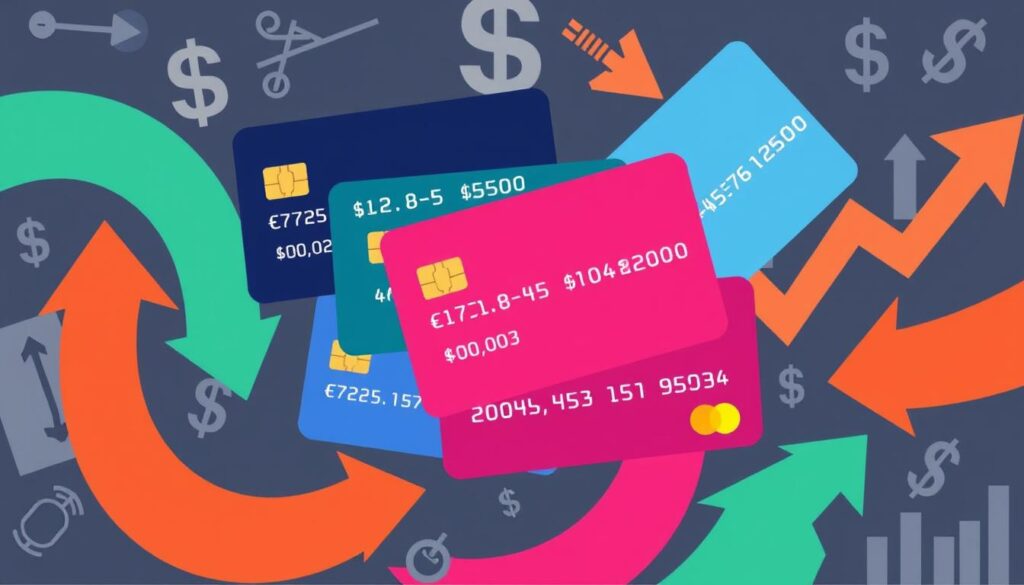Bad credit card reports affect millions of Americans. They can hinder financial progress and cause frustration. This guide will show you how to fix your report for free.
Learn to repair your credit effectively. Find out how to dispute errors and rebuild your credit history. With the right knowledge, you can boost your credit score without spending money.
Key Takeaways
- Understand the importance of a good credit score and how to identify errors in your credit report
- Learn effective strategies to dispute negative entries and rebuild your credit history
- Explore the pros and cons of credit repair services and debt management options
- Discover habits and tips for maintaining good credit and improving your financial literacy
- Leverage consumer rights and protections to safeguard your credit and financial well-being
Understanding Your Credit Report
Your credit report is vital for good financial health. It shows your credit history and how trustworthy you are with money. Knowing what’s in your report helps you make smart choices.
What is a Credit Report?
A credit report shows your borrowing and repayment history. It lists your credit accounts, payment habits, and credit balances. Credit bureaus like Experian, Equifax, and TransUnion create these reports.
Lenders, landlords, and employers use these reports. They look at them to see if you’re good with money.
Why is a Good Credit Score Important?
Your credit score is a number from 300 to 850. It sums up your credit history. A high score means you’re good at handling money.
Good scores open doors to better opportunities. You can get loans with lower interest rates. Renting an apartment becomes easier too.
Low scores can cause problems. You might pay more to borrow money. Getting credit or finding a home could be harder.
Understanding your credit report and score is key. It helps you manage your money better. You can work towards your long-term money goals.
Identifying Errors and Inaccuracies
Accurate credit reports are vital for your financial health. Errors and inaccuracies in these reports are surprisingly common. Regular review of your credit report is key to spotting issues.
The dispute process starts with a thorough check of your credit report. Look for wrong personal details, account info, payment histories, or public records. These credit report errors can impact your score.
Check that all listed accounts are yours with correct payment histories. Look out for duplicate accounts or those that don’t belong to you. Make sure account balances, credit limits, and payment statuses are accurate.
- Ensure that all accounts listed on your credit report belong to you and accurately reflect your payment history.
- Check for any duplicate accounts or accounts that do not belong to you.
- Verify that the balances, credit limits, and payment statuses of your accounts are reported correctly.
If you find inaccurate information, act quickly. Dispute these errors with credit bureaus. The process is simple, but follow the steps carefully for effective resolution.
“Vigilantly monitoring your credit report and addressing any discrepancies can help you maintain a healthy credit profile and unlock better financial opportunities.”
Regular credit report reviews help maintain an accurate financial history. This can boost your credit score over time. Better credit opens doors to improved financial opportunities.
Disputing Negative Entries
Understanding your consumer rights is crucial when addressing credit report inaccuracies. You can dispute and potentially remove damaging items like wrongful late payments or erroneous collection accounts.
How to File a Dispute
Start by obtaining your free annual credit report from Experian, Equifax, and TransUnion. Identify errors and contact the credit bureau(s) directly to initiate the dispute process.
You can file disputes online, by mail, or over the phone. Choose the method that works best for you.
Tips for Effective Dispute Letters
A well-crafted dispute letter ensures your concerns are addressed promptly. When writing your letter, follow these key steps:
- Clearly identify the specific item(s) you are disputing and explain why they are inaccurate or incomplete.
- Provide supporting documentation, such as receipts, statements, or other evidence, to support your claim.
- Request that the credit bureau investigate the item(s) and remove them from your credit report if they cannot be verified.
- Keep a copy of your dispute letter and any correspondence with the credit bureau for your records.
You have the right to a fair and accurate credit report. By understanding the dispute process, you can improve your credit standing.
Taking action can help you achieve your financial goals. Don’t hesitate to advocate for your rights.
“Maintaining a clean credit report is essential for securing favorable loan terms, renting an apartment, and even getting hired for certain jobs. Disputing negative entries is a powerful tool in your financial toolkit.”
Rebuilding Your Credit History
Rebuilding credit can be challenging, but proven strategies can help. Two effective methods are secured credit cards and becoming an authorized user.
Obtaining a Secured Credit Card
A secured credit card requires a refundable security deposit, usually $200 to $500. This deposit becomes your credit limit. Your payments and usage are reported to major credit bureaus.
Using a secured card responsibly can help rebuild your credit history. Make on-time payments and keep your credit utilization low.
Becoming an Authorized User
Another way to rebuild your credit history is becoming an authorized user on someone else’s card. This lets you benefit from the primary cardholder’s positive credit history.
The account activity will be added to your credit report. This can potentially help build your credit over time.
| Strategy | How it Helps | Key Considerations |
|---|---|---|
| Secured Credit Card | Helps rebuild credit history through responsible usage and on-time payments | Requires a refundable security deposit, typically $200-$500 |
| Authorized User | Allows credit building by benefiting from the primary cardholder’s positive credit history | Rely on the primary cardholder’s creditworthiness and payment history |
These strategies can help you take steps to rebuild your credit history. They can lead you towards a stronger financial future.

Credit Repair Services: Pros and Cons
Credit repair can be tricky, making people consider professional help. These services aim to boost credit scores and fix negative items. But using them isn’t always a clear choice.
Expert guidance is a key benefit of credit repair services. Professionals can spot and challenge wrong or fake items on your report. They can also create custom plans to rebuild your credit history.
However, these services often come with high costs. Some charge big fees, adding to your money troubles. There’s also a risk of shady companies making false promises.
| Pros of Credit Repair Services | Cons of Credit Repair Services |
|---|---|
|
|
Your choice should depend on your money situation and goals. Research different providers to find a trusted, ethical company. Sometimes, fixing your credit yourself or getting counseling works better.
“Repairing your credit can be a complex and time-consuming process, but with the right guidance and tools, it’s a challenge that can be overcome.”
free fix bad credit card report
Boost your credit score without spending money. You can fix your bad credit card report for free with smart actions. Learn about your credit report and take steps to remove negative items and improve your score.
A key step in free credit repair is spotting errors on your credit report. This takes time, but it’s worth it. By challenging wrong entries, you can improve your credit score and build a better financial future.
Building good credit history also helps credit score improvement. Get a secured credit card or become an authorized user on someone’s account. Always pay your bills on time.

Fixing your bad credit card report takes time and effort. Use free resources and strategies to improve your financial health. With patience, you can achieve the credit score you want.
“With the right approach, you can fix your bad credit without spending a dime on expensive credit repair services.”
Debt Management Strategies
Dealing with debt can be tough. But smart strategies can help you control your finances. Let’s explore options like debt management and debt consolidation to improve your credit score.
Debt Consolidation Options
Debt consolidation combines multiple debts into one payment. This can lower interest rates and simplify repayments. It helps you stay on track with your money goals.
Popular options include personal loans, balance transfer cards, and home equity loans. These tools can make debt management easier and more effective.
Creating a Realistic Budget
A realistic budget is key for debt management and financial planning. Track your income and expenses carefully. Find areas to cut back and put money towards debt repayment.
This approach helps you control your finances. It also supports long-term credit improvement efforts.
“Creating a realistic budget is the first step towards financial freedom and a better credit score.”
Use these strategies to manage your debt better. Stay consistent and disciplined in your approach. This will improve your financial health and credit over time.
Improving Credit Utilization Ratio
Your credit utilization ratio affects your credit score. It compares your used credit to your total credit limit. A low ratio is crucial for a strong credit profile.
For credit cards, aim to use less than 30% of your available credit. This shows lenders you’re a responsible borrower. It can boost your credit score factors.
Strategies for Improving Credit Utilization Ratio
- Monitor your credit card balances regularly: Closely track your credit card usage to ensure that you’re not exceeding the 30% threshold.
- Request credit limit increases: Contact your credit card issuers and request an increase in your credit limits. This can immediately improve your credit utilization ratio without changing your spending habits.
- Pay down your balances: Make it a priority to pay down your credit card balances, focusing on the cards with the highest utilization rates first. This will help lower your overall credit card management.
- Consider debt consolidation: If you’re struggling with multiple high-balance credit cards, consolidating your debt into a single loan or balance transfer card can simplify your payments and improve your utilization ratio.
| Credit Utilization Ratio | Impact on Credit Score |
|---|---|
| Below 30% | Positive impact on credit score |
| Above 30% | Negative impact on credit score |
| Above 50% | Significant negative impact on credit score |
Understanding a healthy credit utilization ratio is key. Use smart strategies to improve it. This helps manage your credit cards and boost your credit score factors.

The Impact of Late Payments
Late payments can seriously harm your credit score. They make it harder to get loans, credit cards, housing, and jobs. The impact depends on how often and how late you pay.
Creditors report late payments to credit bureaus. This leads to a drop in your credit score. Understanding these consequences is vital for maintaining good credit.
Negotiating with Creditors
Don’t lose hope if you’ve made late payments. You can often negotiate with creditors to lessen the damage. Reach out and explain your situation clearly.
Creditors may remove the late payment from your report. They might also offer a workable payment plan. Be ready to show proof and outline your future payment strategy.
- Explain your situation and express a willingness to resolve the issue
- Provide supporting documentation to demonstrate your commitment to making timely payments
- Negotiate a payment plan or request the removal of the late payment from your credit report
Take action and talk to your creditors. You can minimize the impact of late payments on your credit score. Effective creditor negotiations can help improve your financial situation.
Consumer Rights and Protections
Understanding your rights in credit reporting and credit repair is vital. Laws protect you from unfair practices. You can act against inaccuracies by creditors or credit reporting agencies.
The Fair Credit Reporting Act (FCRA) ensures accurate, fair, and private credit reports. It grants you the right to dispute errors. Credit agencies must investigate and correct issues promptly.
The Fair Debt Collection Practices Act (FDCPA) protects consumers from abusive debt collectors. It bans harassing calls and legal threats. This law is crucial for safeguarding your rights.
- You have the right to request a free copy of your credit report annually from each of the three major credit bureaus: Experian, Equifax, and TransUnion.
- You can dispute any errors or inaccuracies in your credit report directly with the credit reporting agencies, and they are required to investigate and correct the issues within a specified time frame.
- Credit repair companies must follow specific guidelines and disclose their services and fees upfront, as outlined in the Credit Repair Organizations Act (CROA).
Knowing your consumer rights empowers you in credit matters. Understanding credit repair laws helps you navigate credit report disputes. This knowledge is key to controlling your financial future.
“Knowledge is power, and knowing your consumer rights is the first step towards achieving financial stability and success.”

Credit Counseling: An Effective Solution
Struggling with debt and credit scores? Professional credit counseling can be a game-changer. These services offer a comprehensive approach to regaining financial stability. They help individuals take control of their credit history.
Credit counseling provides resources and personalized guidance for credit repair. Experienced counselors offer insights into credit counseling, debt management, and financial education. They empower you to make informed decisions and develop effective strategies.
- Debt management plans: Credit counselors can help you consolidate and negotiate with your creditors, potentially reducing interest rates and monthly payments.
- Budgeting and financial education: Counselors provide tools and resources to help you create a realistic budget, improve your spending habits, and develop a long-term plan for maintaining good credit.
- Credit report review and dispute assistance: Counselors can review your credit report, identify any errors or inaccuracies, and assist you in disputing them to improve your credit score.
Partnering with a reputable credit counseling agency gives you expert support. They work tirelessly to help you achieve financial wellness. Their goal is to rebuild your credit history.
Take the first step towards a brighter financial future. Explore the benefits of credit counseling today.
“Credit counseling changed my life. The guidance and support I received helped me pay off my debts and improve my credit score significantly. It was a game-changer for me.” – Sarah, a former credit counseling client.
Habits for Maintaining Good Credit
A good credit score is key for financial stability. The real challenge is keeping it high over time. Developing good habits and monitoring your credit report regularly can help.
Monitoring Your Credit Report
Checking your credit report often is crucial for healthy credit. It helps you spot and fix errors quickly. This prevents negative impacts on your score.
Review your report from Experian, Equifax, and TransUnion yearly. Do it more if you suspect issues. Set reminders to check your report regularly.
Use free credit monitoring services to track changes. Dispute any errors you find with the credit bureaus right away.
- Set calendar reminders to review your credit report on a regular basis.
- Take advantage of free credit report monitoring services to stay on top of any changes or suspicious activity.
- Dispute any inaccuracies or errors you find with the respective credit bureaus to ensure your credit report accurately reflects your financial history.
Good credit habits and regular monitoring protect your financial health. They help you maintain a strong credit profile over time.
| Good Credit Habits | Benefits |
|---|---|
| Regularly reviewing credit report | Identify and address errors, prevent negative impact on credit score |
| Utilizing credit monitoring services | Stay informed about changes and suspicious activity in your credit profile |
| Disputing inaccuracies with credit bureaus | Ensure your credit report accurately reflects your financial history |
Good credit habits and monitoring help maintain a strong credit profile. They safeguard your financial well-being for years to come.
Financial Literacy and Education
A healthy credit profile requires ongoing financial education. By expanding your knowledge, you can make informed decisions about your financial future. This empowers you to manage your credit effectively.
To build financial literacy, explore the many resources available. Online tutorials, educational websites, and personal finance books can help. These tools deepen your understanding of credit-related topics.
- Learn about the components of a credit report and how to interpret your credit score.
- Discover strategies for effective budgeting and debt management.
- Explore the ins and outs of personal finance, including investment options and retirement planning.
Ongoing financial education equips you to navigate the credit landscape. It fosters empowerment and control over your credit management. This knowledge helps you make better personal finance decisions.
| Resource | Description |
|---|---|
| Financial Literacy Courses | Online and in-person courses that cover a wide range of personal finance topics, including budgeting, credit management, and investment strategies. |
| Credit Counseling Services | Nonprofit organizations that provide free or low-cost guidance on credit-related issues, debt management, and financial planning. |
| Personal Finance Blogs and Podcasts | Informative and engaging online resources that offer practical tips, advice, and insights on managing your money and improving your financial well-being. |
Commit to continuous financial education to navigate complex credit management issues. This commitment will help you achieve your financial goals. You’ll secure a brighter future through improved personal finance skills.
“Investing in your financial education is one of the most valuable investments you can make.” – Robert Kiyosaki
Conclusion
This guide has shown you how to fix your bad credit card report for free. You’ve learned about credit scores, disputing errors, and rebuilding your credit history. Now you have the tools to improve your financial future.
Credit repair can open doors to financial freedom. By using these strategies, you can boost your credit score. This leads to better interest rates and loan terms. It also creates more opportunities for personal and professional growth.
Your credit score isn’t set in stone. With hard work, you can improve it. Remember, you have the power to achieve the credit score you want.
Start your credit improvement journey with confidence. You now have the knowledge to navigate this process effectively. Embrace financial literacy and work towards a more secure future.

